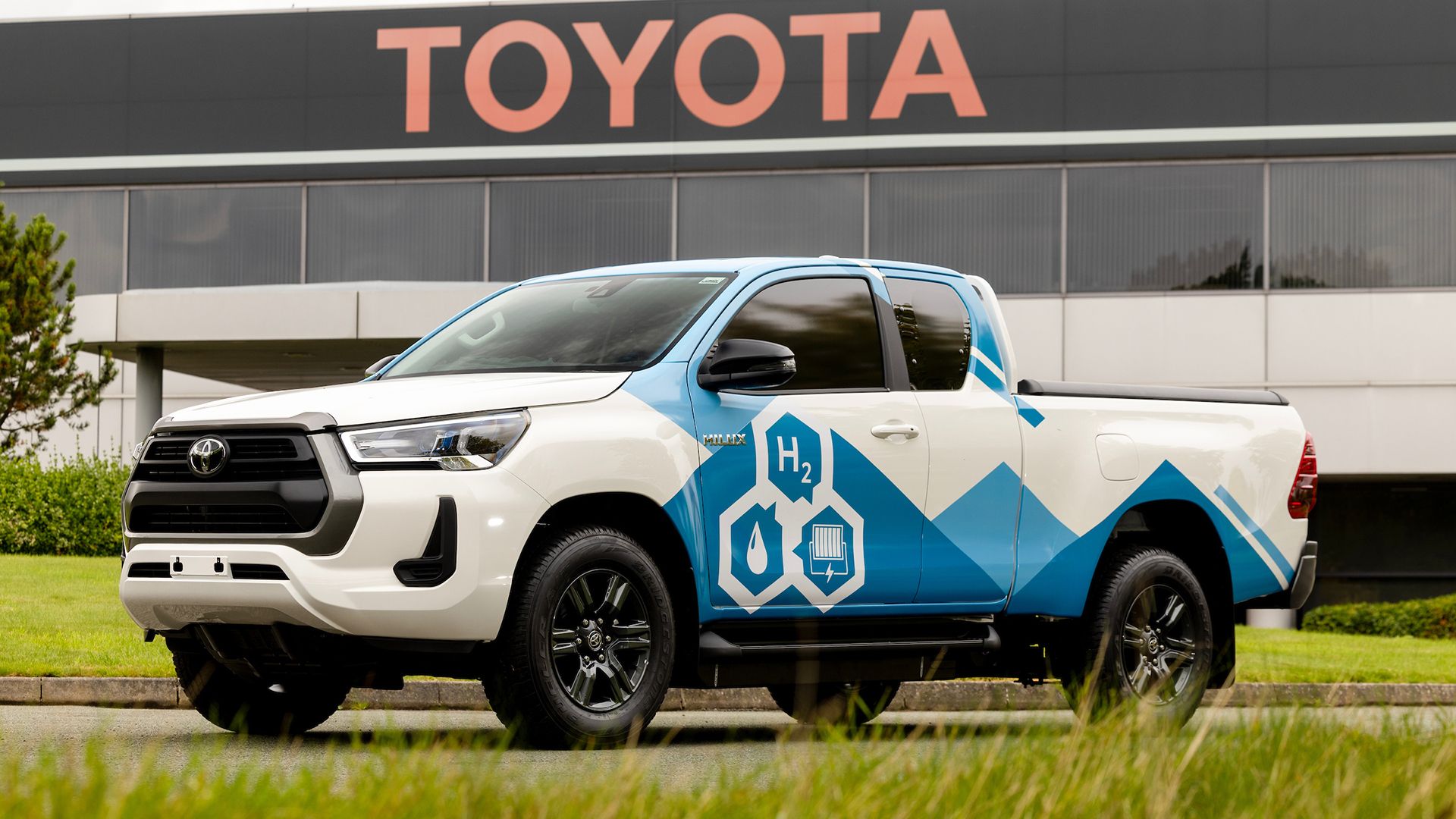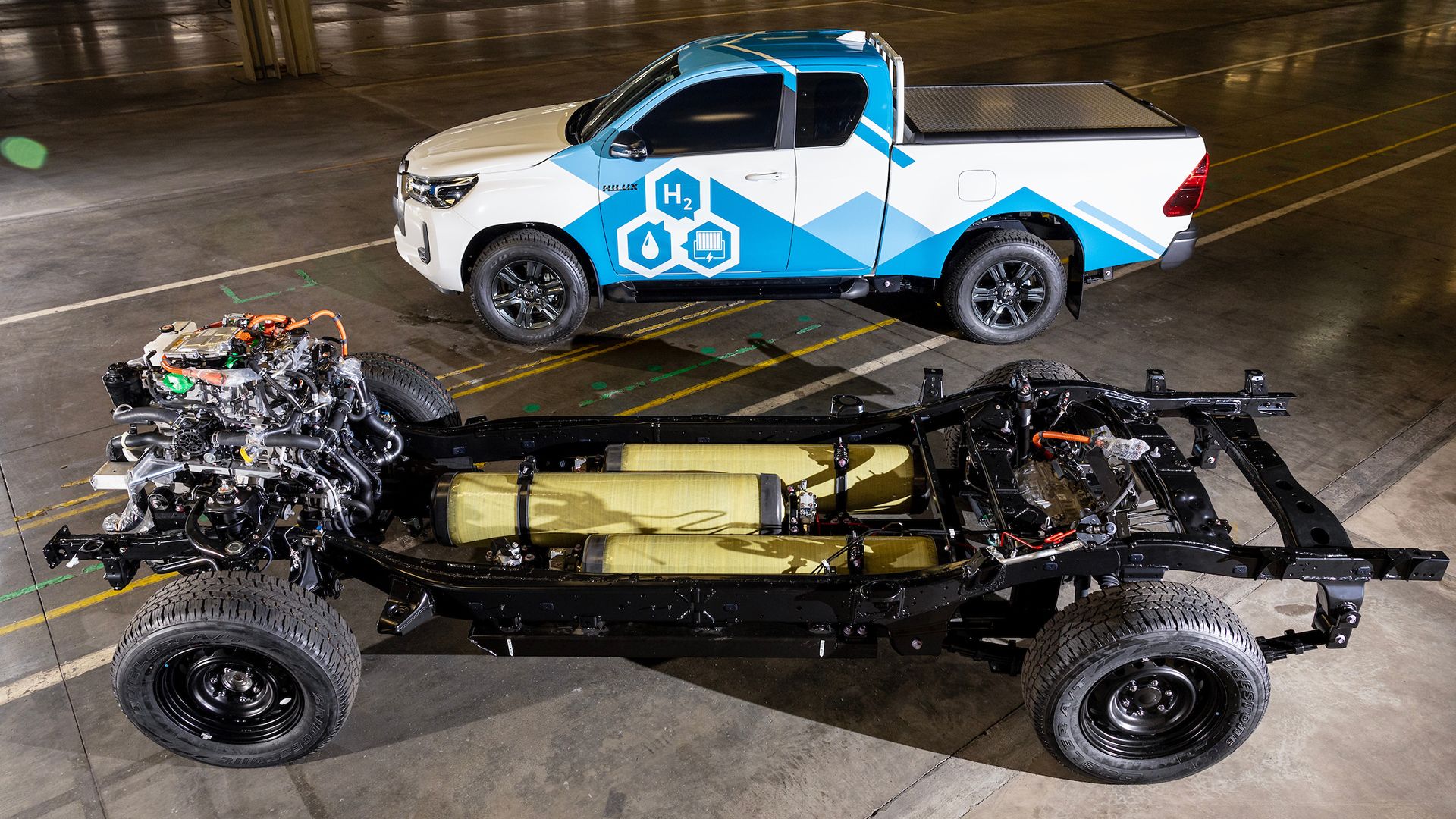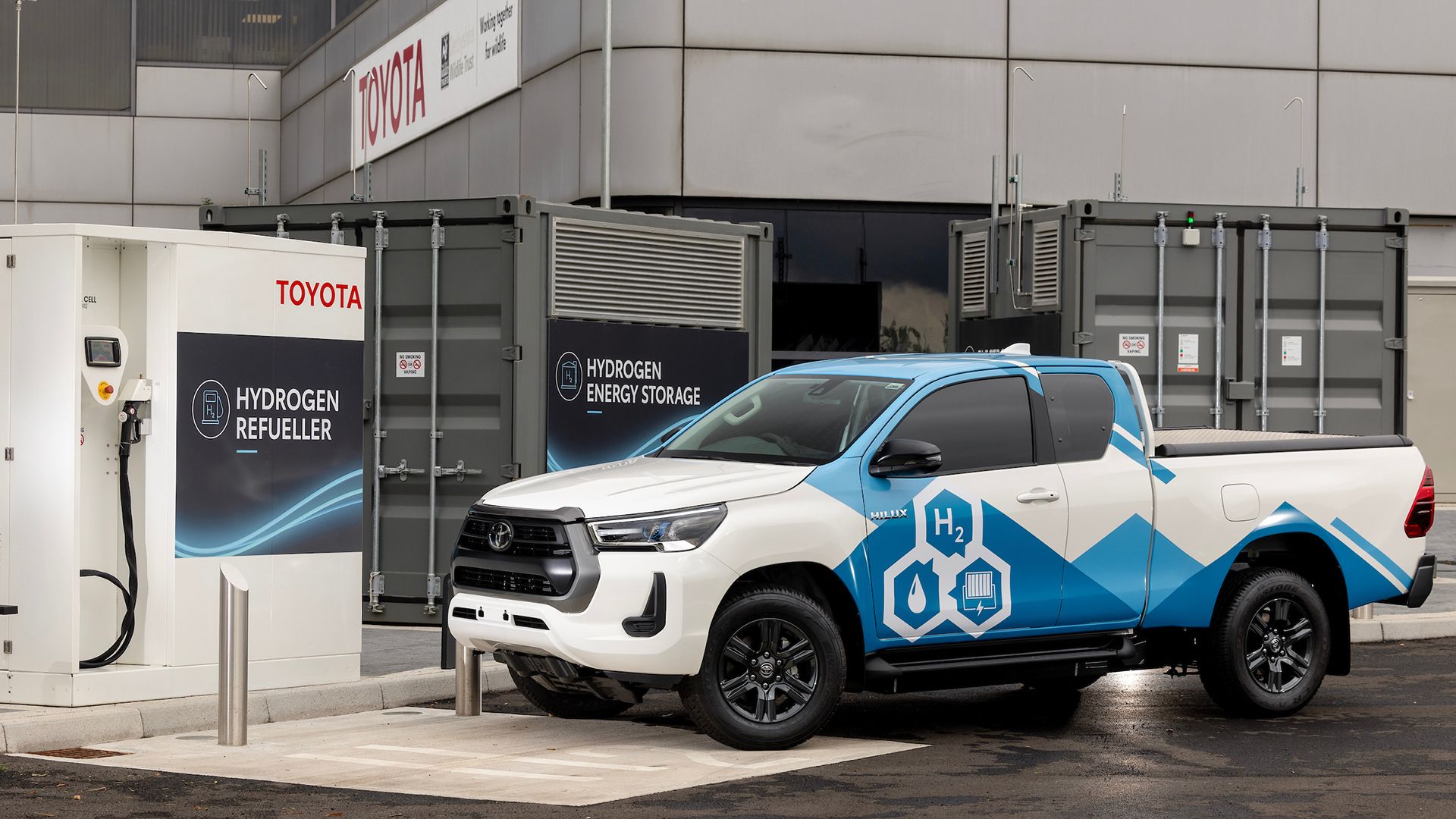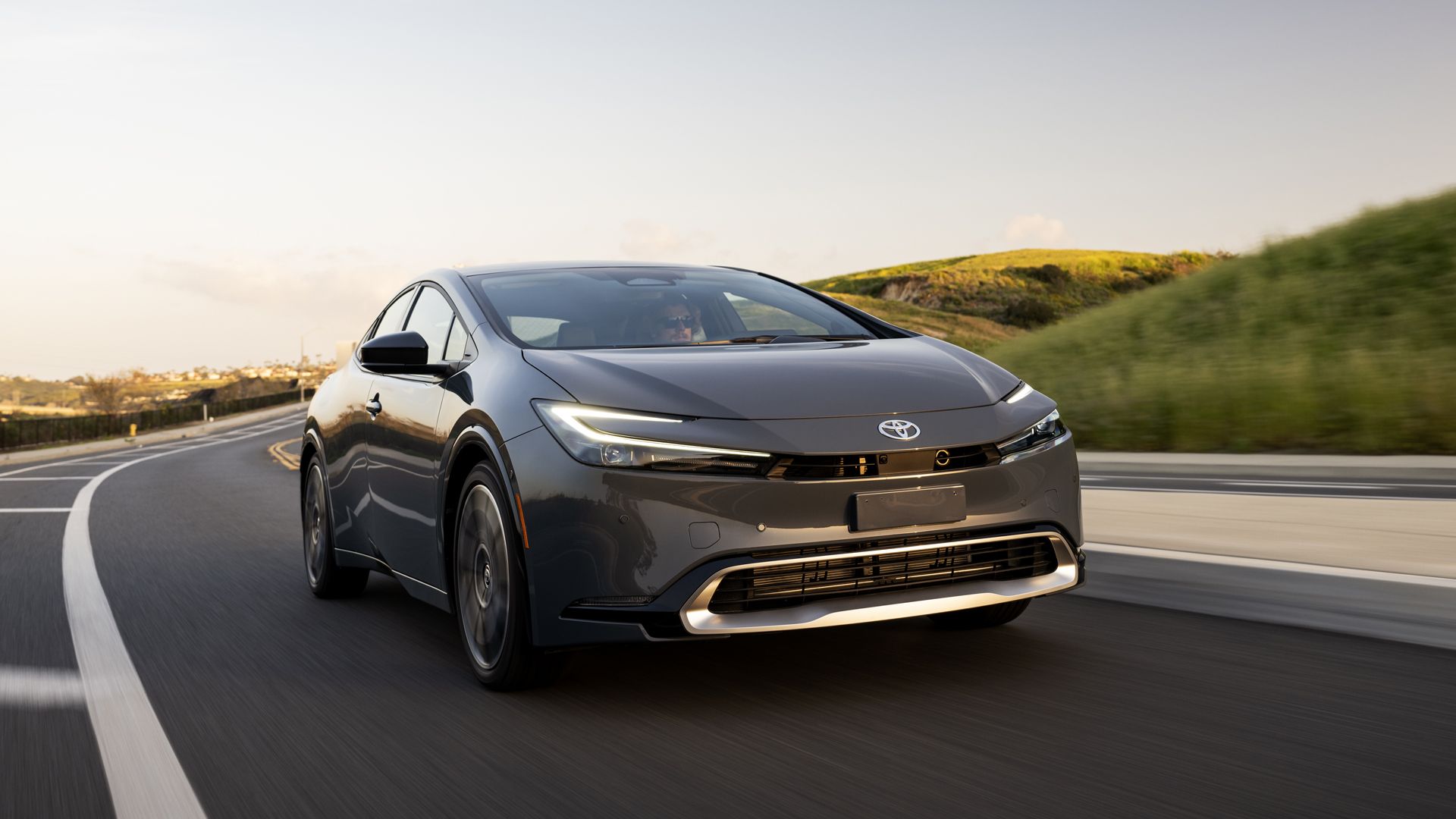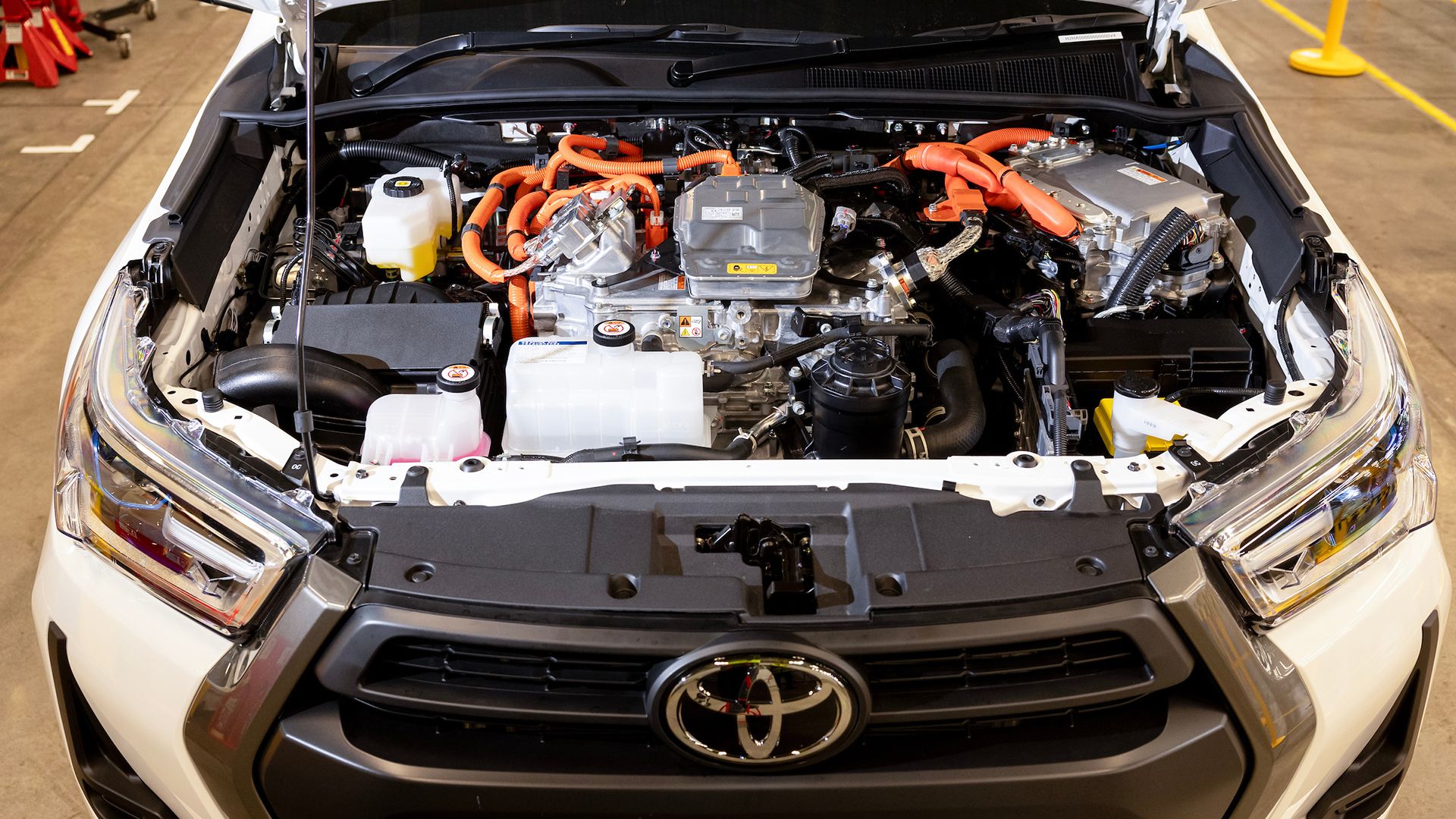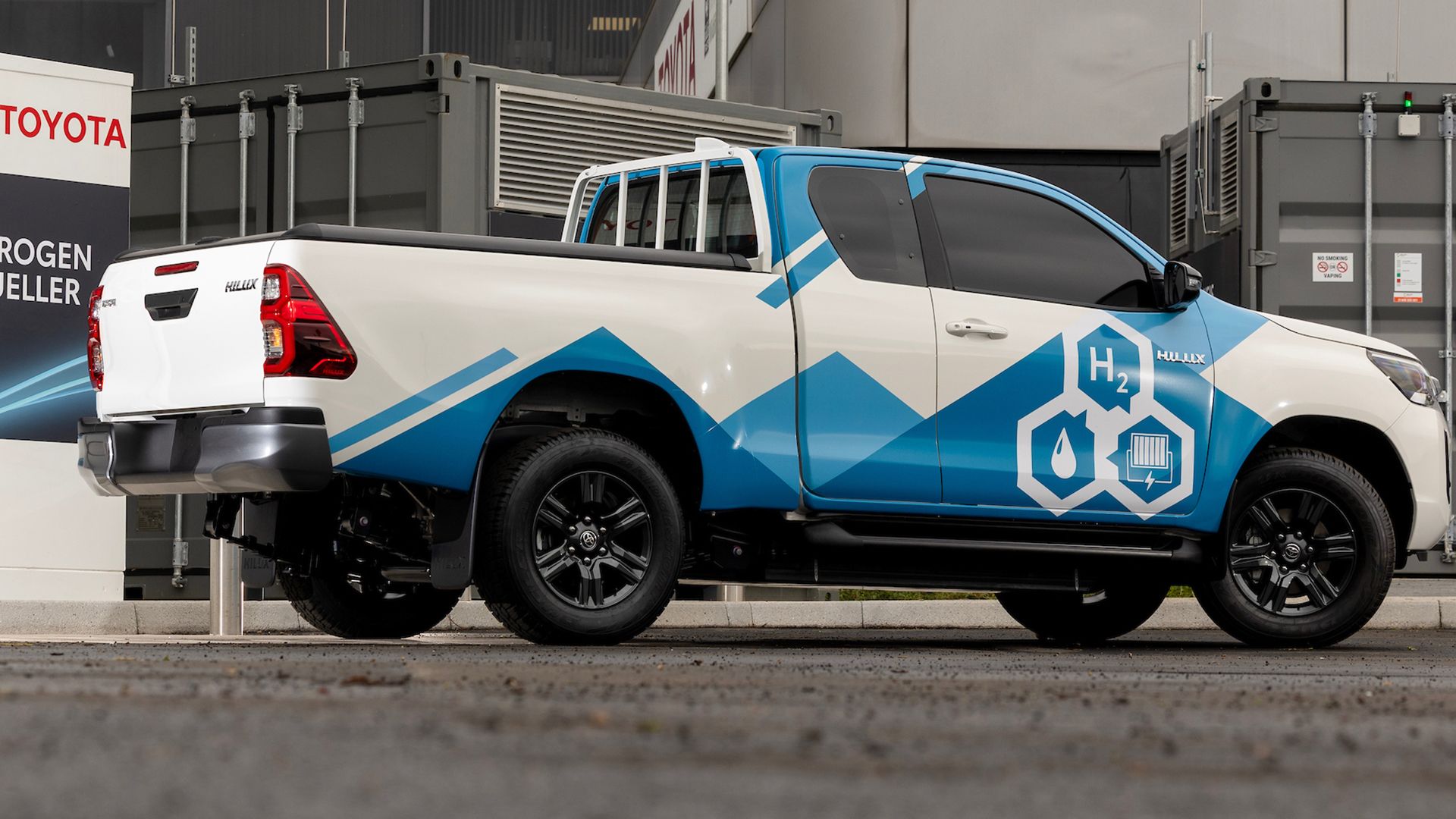Summary
- Toyota UK has introduced a prototype hydrogen-powered Hilux truck, aiming to fill the market gap for hydrogen trucks that currently only has family SUVs and midsize cars.
- The hydrogen Hilux borrows its powertrain from the Mirai and has a driving range of over 600 km (374 miles), making it suitable for applications within the boundaries of hydrogen fueling networks.
- Toyota's focus on hydrogen vehicles aligns with their earlier success in introducing hybrids, and despite entering the battery EV market recently, the company has affirmed its commitment to hydrogen. The success of hydrogen may depend on the availability of hydrogen fueling infrastructure.
Toyota UK has unveiled a prototype hydrogen-powered Hilux truck. The hydrogen Hilux may be an attempt to do for trucks what the Ford F-150 Lightning did for battery EVs: prove that they can be big galumphers instead of wedge-nosed coupes. The world of hydrogen cars is currently populated almost exclusively by family SUVs and midsize cars, leaving a market vacancy where the trucks should be.
The Hydrogen Hilux: What We Know So Far
The prototype Hilux borrows much of its powertrain from the Mirai, which - as Toyota proudly claims - has been in production for “almost 10 years.” Photos show that the motor has been relocated to the rear axle. The truck divides its fuel among three tanks, which occupy most of the space between the axles under the vehicle. Toyota claims that the hydrogen Hilux has a driving range of “over 600 km” (374 miles). The battery that provides reserve power is placed in the truck bed instead of the cab, a discreet nod to the fact that the modern truck carries people more often than it does cargo.
While this isn’t the same driving range as gasoline or diesel trucks, the Hilux nevertheless has the distance capacity to be useful for any application that doesn’t require long hauls beyond the boundaries of hydrogen fueling networks.
Toyota built the Hilux in its UK manufacturing plant (which it calls a “production center”) in Derby, Scotland. The truck has been in the works since 2022. To develop the hydrogen Hilux, Toyota formed a consortium with four other companies. The project is partially funded by the UK national government.
The World Isn’t Ready For A Hydrogen Pickup, But It Wasn’t Prepared For An Electric Truck Either
Trucks have never been more popular. Whether it’s a plywood hauler, a family hauler, or a commuter that hauls nothing, people want to drive a vehicle with a lot of airspace under the floor pan and truck bed on the back. It is surprising that no company has put out a hydrogen pickup truck, even though the market for hydrogen cars is currently so small that one inevitably encounters the word “niche.”
The development of a hydrogen Hilux parallels the EV market shift when Ford introduced the F-150 Lightning. Because Tesla was the first company to actually get large numbers of people to buy them, people tend to think of EVs as small tech-laden sports cars (or at least sports-adjacent ones). Ford’s first announcements of its forthcoming electric truck were met with skepticism in the op-ed sections of car magazines. (“Will people want a truck without the roar of an engine?”) However, sales figures have proved that the expert naysayers didn’t understand the American truck buyer. The F-150 Lightning proved that it’s possible to sell an electric truck to the manliest of men— even the ones who thought a zippy Tesla would wreck their “man-cred.”
In a similar vein, hydrogen cars are currently seen as weird Los Angeles curiosities (because that’s one of the few places in North America where one can get fuel for them), or as the choice of environmentalists and anyone else who opposes all that is deep-fried and right with this world. But with sufficiently burly styling, a hydrogen Hilux could be a surprise success.
Toyota Introduced The World To Hybrids, But Avoided EVs Until Recently
Toyota has taken an interesting course as the automotive world moves beyond engine-powered cars. While the rest of the industry has followed Tesla’s lead and introduced battery electric vehicles, Toyota has made itself the vanguard of hybrids and hydrogen.
While it may seem foolhardy for Toyota to continue its long hydrogen crusade, the company has found success with kooky powertrains before. This is the company that introduced the world to hybrid cars. (Yes, other companies produced hybrids before. However, none of them stayed in business.)
Toyota took the radical step of putting a then-unheard-of hybrid powertrain into an inoffensive appliance car instead of an enthusiast-approved coupe. Given how unremarkable hybrids are today, it’s hard to overstate what a hard sell they were when the first Prius left the factory. It was a bold move to sell this newfangled powertrain to the “I just want to get from A to B” crowd instead of sports car fans, who tend to be far more forgiving of mechanical failures and general automotive finickiness.
It Seems Toyota Prefers Hydrogen to Battery EVs
Until very recently, Toyota had no battery EVs in its catalog. The company introduced the bZ4X SUV, its lone entry in the growing field of BEVs, in 2023. Outgoing CEO Akio Toyoda’s successor, Koji Sato, has proven less BEV-averse— but has also affirmed that Toyota will not abandon hydrogen.
CEO emeritus Akio Toyoda had a famous distaste for battery EVs. Under Toyoda’s direction, Toyota favored hybrids and hydrogen, the latter to great success. The Prius remains the world’s definitive hybrid car, which has kept sales brisk but given hybrids (regardless of manufacturer) an “appliance car” stigma that no amount of sportiness has overcome. In the years since the Prius took off (and earned a permanent place in every true-blood gearhead’s hate list), Toyota has expanded its hybrid lineup to include SUVs, crossovers, hatchbacks, trucks, and hybrid variants of its perennial bestsellers the Corolla and Camry.
Toyota may be hoping to repeat this success with hydrogen vehicles. Similar to the company’s first hybrid, its first hydrogen car is a sensible sedan instead of a low-riding, two-door/two-seat speedster. Admittedly, a Mirai looks a lot prettier than a Prius. Right now, hydrogen fuel cells are still “too new to trust,” just like hybrids were at first. However, no one had to wait for the first hybrid-specific fueling station, nor did anyone have to wait for electricity to reach their towns before they could plug in a Tesla overnight. Toyota is making a bigger gamble with hydrogen than it ever did with hybrids. Despite the massive amounts of money Toyota has put into hydrogen, it could end up as a historical footnote like the company's brief flirtation with mid-engine minivans.
If The Time Is Right For Hydrogen, Toyota Will Be Ready
Hydrogen may finally take off after years of being on the automotive sidelines. The EU has mandated that by 2030, hydrogen pumping stations be constructed every 125 miles along motorways, along with requiring at least one hydrogen station in every town with a population over 100,000. In other words, an entire continent of car buyers will no longer object to hydrogen cars with “But where do I fill it up?”
Whether Toyota is currently falling victim to the hydrogen sunk-cost fallacy remains to be seen. The automaker has almost quixotically invested itself in hydrogen. Outside of domestic vehicles, Toyota has been actively developing hydrogen commercial trucks. Some industry analysts see long-haul trucking as a possible first step in wide-scale hydrogen adoption, arguing that it’s easier to put hydrogen pumps (and the required supporting infrastructure) in truck stops than to put one on every other street corner. Whether hydrogen becomes a serious rival to battery EVs, Toyota is one of the most profitable car companies on the planet. If hydrogen fails and takes the prototype Hilux with it, Toyota can afford the risk.

